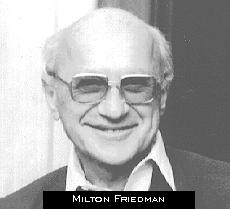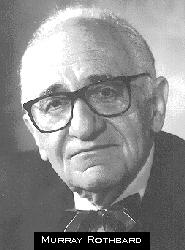10. How would anarcho-capitalism work?
アナルコ・キャピタリズムはどう機能するか
Most of the prominent anarcho-capitalist writers have been
academic economists, and as such have felt it necessary to
spell out the workings of their preferred society in rather
greater detail than the left-anarchists have. In order to best
grasp the anarcho-capitalist position, it is helpful to realize
that anarcho-capitalists have emerged almost entirely out of
the modern American libertarian movement, and believe that
their view is simply a slightly more extreme version of the
libertarianism propounded by e.g. Robert Nozick.
訳: 著名なアナルコ・キャピタリストはほとんどの場合経済学者である。
彼らは自分たちの望む社会のメカニズムを
経済学者として説明することに努めてきた。
そしてそのやり方はレフト・アナーキストたちよりもずっと詳細である。
アナルコ・キャピタリズムの考えをうまくつかむには、
まずそれが大部分において現代アメリカのリバタリアン・ムーブメントから
出てきたということ、
またそれが単にRobert Nozickなどによって
提唱されたリバタリアニズムの、究極度を少し上げたバージョンだということ
を知っておくとよいだろう。
 FAQs on the broader libertarian movement are widely
available on the Net, so we will only give the necessary
background here. So-called "minarchist" libertarians such
as Nozick have argued that the largest justified government
was one which was limited to the protection of individuals
and their private property against physical invasion;
accordingly, they favor a government limited to supplying
police, courts, a legal code, and national defense. This
normative theory is closely linked to laissez-faire economic
theory, according to which private property and unregulated
competition generally lead to both an efficient allocation of
resources and (more importantly) a high rate of economic
progress. While left-anarchists are often hostile to
"bourgeois economics," anarcho-capitalists hold classical
economists such as Adam Smith, David Hume,
and Jean-Baptiste Say in high regard, as well as more modern
economists such as Joseph Schumpeter, Ludwig von Mises,
F.A. Hayek, Milton Friedman, George Stigler, and James
Buchanan. The problem with free-market economists, say
the anarcho-capitalists, is not that they defend the free
market, but merely that their defense is too moderate and
compromising.
FAQs on the broader libertarian movement are widely
available on the Net, so we will only give the necessary
background here. So-called "minarchist" libertarians such
as Nozick have argued that the largest justified government
was one which was limited to the protection of individuals
and their private property against physical invasion;
accordingly, they favor a government limited to supplying
police, courts, a legal code, and national defense. This
normative theory is closely linked to laissez-faire economic
theory, according to which private property and unregulated
competition generally lead to both an efficient allocation of
resources and (more importantly) a high rate of economic
progress. While left-anarchists are often hostile to
"bourgeois economics," anarcho-capitalists hold classical
economists such as Adam Smith, David Hume,
and Jean-Baptiste Say in high regard, as well as more modern
economists such as Joseph Schumpeter, Ludwig von Mises,
F.A. Hayek, Milton Friedman, George Stigler, and James
Buchanan. The problem with free-market economists, say
the anarcho-capitalists, is not that they defend the free
market, but merely that their defense is too moderate and
compromising.
訳: より広範なリバタリアニズムについてのFAQはネットで容易に入手できる。
そこでここでは必要なバックグラウンドだけを紹介する。
ノージックのようないわゆるミナーキスト・リバタリアン(最小国家論者)によると、
正当化される最大の政府は、個人とその財産を物理的な侵害から保護するだけの政府である。彼らはそれゆえ警察・裁判所・法律・国防だけを供給する政府が望ましいと考える。
この規範理論はレッセフェール(自由主義)の経済学と密接につながっている。
レッセフェール経済学は私有財産と自由競争によって効率的な資源配分と(より重要なこととして)高い経済成長率が実現されるという理論である。
レフト・アナーキストが「ブルジョア経済学」にしばしば敵意をもっている一方で、
アナルコ・キャピタリストはAdam Smith, David Hume, Jean-Baptiste Sayといった昔の経済学者またJoseph Schumpeter, Ludwig von Mises, F.A. Hayek, Milton Friedman, George Stigler, James Buchananといった現代の経済学者を尊敬している。
アナルコ・キャピタリストにとっては、これら自由市場経済学者たちの問題点は
自由市場を擁護しているということではなく、その擁護が穏健で妥協的すぎるということ
なのだ。
 (Note however that the left-anarchists' low opinion of the
famous "free-market economists" is not monolithic: Noam
Chomsky in particular has repeatedly praised some of the
political insights of Adam Smith. And Peter Kropotkin also
had good things to say about Smith as both social scientist
and moralist; Conal Smith
explains that "In particular he
approved of Smith's attempt to apply the scientific method to
the study of morals and society, his critique of the state in
The Wealth of Nations, and his theory of human
sociability in The Theory of Moral Sentiments.")
(Note however that the left-anarchists' low opinion of the
famous "free-market economists" is not monolithic: Noam
Chomsky in particular has repeatedly praised some of the
political insights of Adam Smith. And Peter Kropotkin also
had good things to say about Smith as both social scientist
and moralist; Conal Smith
explains that "In particular he
approved of Smith's attempt to apply the scientific method to
the study of morals and society, his critique of the state in
The Wealth of Nations, and his theory of human
sociability in The Theory of Moral Sentiments.")
訳: (レフト・アナーキストが有名な自由市場経済学者を必ずしも低く評価していないということをここで指摘しておこう。とりわけNoam ChomskyはAdam Smithの政治的洞察のいくつかを繰り返し称賛している。
Peter Kropotkinもまた社会科学者兼道徳学者としてのスミスを高く評価していた。
Conal Smithによると「スミスの科学的方法を道徳と社会の研究に応用した試み、The Wealth of Nationsでの国家批判、The Theory of Moral Sentimentsでの人間の社会性の理論といったものを、クロポトキンは特に評価した」。)
Now the anarcho-capitalist essentially turns the minarchist's
own logic against him, and asks why the remaining functions
of the state could not be
turned over to the free market. And
so, the anarcho-capitalist imagines that police services
could be sold by freely competitive firms; that a court system
would emerge to peacefully arbitrate disputes between
firms; and that a sensible legal code could be developed
through custom, precedent, and contract. And in fact, notes
the anarcho-capitalist, a great deal of modern law (such as
the Anglo-American common law) originated not in
legislatures, but from the decentralized rulings of judges.
(The anarcho-capitalist shares Kropotkin's interest in
customary law, but normally believes that it requires
extensive modernization and articulation.)
訳: いまやアナルコ・キャピタリストは最小国家論者のロジックを完全に退ける。そして逆に問いただす。なぜ(国家の)残りの機能も自由市場にゆだねないのですかと。アナルコ・キャピタリストは、自由競争をする企業が警察サービスを供給し、新しい裁判システムが企業間のトラブルを円満に解決し、そして慣習・判例・契約が実用的な法体系をつくり上げていく世界を思い描いているのだ。 アナルコ・キャピタリストの指摘によると、実際
(英米のコモンローのような)現代法の多くは立法府から生み出されたものではなく、分散化された判事たちの決定から生まれたものである。
(アナルコ・キャピタリストたちは慣習法への関心をクロポトキンと共有するが、
彼の考えはずっと現代化・洗練化されることが必要だと普通思っている。)
The anarcho-capitalist typically hails modern society's
increasing reliance on private security guards, gated
communities,
arbitration and mediation, and other
demonstrations of the free market's ability to supply the
defensive and legal services normally assumed to be of
necessity a government monopoly. In his ideal society,
these market alternatives to government services would take
over all legitimate security services. One plausible
market structure would involve individuals subscribing to
one of a large number of competing police services; these
police services would then set up contracts or networks for
peacefully handling disputes between members of each
others' agencies. Alternately, police services might be
"bundled" with housing services, just as landlords often
bundle water and power with rental housing, and gardening
and security are today provided to residents in gated
communities and apartment complexes.
訳: 典型的アナルコ・キャピタリストは現代社会において増大する民間への信頼を喜んで眺める。警備会社、ゲーテッド・コミュニティ、仲裁機関、その他(通常必要不可欠な政府の独占と考えられる保護・司法サービスさえ供給する)自由市場が見せてくれるさまざまなもの。
彼らの理想とする社会では、こういった市場的代替物が
政府によるすべての 治安サービスに取って代わるのである。
一つのありそうな市場構造としては、競争する数多くの警察サービスに各個人が加入するというのが考えられる。別々のサービスに加入する個人間の争いを平和に解決するために、
各サービス会社は他社と契約を結んだりネットワークを作ったりする。
別のありそうな市場構造としては、警察サービスが住宅サービスと「セット売り」にされるというのが考えられる。これはちょうど水道と電気が賃貸住宅とセットで提供されるのと同じであるし、今日ガーデニングやセキュリティが
ゲーテッド・コミュニティあるいは共同住宅の住人に提供されるのと同じである。
The underlying idea is that contrary to popular belief, private
police would have strong incentives to be peaceful and
respect individual rights. For first of all, failure to peacefully
arbitrate will yield to jointly destructive warfare, which will
be bad for profits. Second, firms will want to develop long-
term business relationships, and hence be willing to
negotiate in good faith to insure their long-term profitability.
And third, aggressive firms would be likely to attract only
high-risk clients and thus suffer from extraordinarily high
costs (a problem parallel to the well-known "adverse
selection problem" in e.g. medical insurance -- the problem
being that high-risk people are especially likely to seek
insurance, which drives up the price when riskiness is hard
for the insurer to discern or if regulation requires a uniform
price regardless of risk).
Anarcho-capitalists generally give
little credence to the view that their "private police agencies"
would be equivalent to today's Mafia --
the cost advantages
of open, legitimate business would make "criminal police"
uncompetitive. As David Friedman explains in The Machinery of
Freedom, "Perhaps the best way to see why anarcho-capitalism would
be so much more peaceful than our present system is by analogy.
Consider our world as it would be if the cost of moving from one
country to another were zero. Everyone lives in a housetrailer
and speaks the same language. One day, the president of France
announces that because of troubles with neighboring countries, new
military taxes are being levied and conscription will begin shortly.
The next morning the president of France finds himself ruling a
peaceful but empty landscape, the population having been reduced to
himself, three generals, and twenty-seven war correspondents."
訳: 基本にある考え方は、一般的な信念とは反対に、
民間警察は平和的でありかつ個人の権利を尊重する強いインセンティブをもつだろうということである。第一に、仲裁に失敗することは相互に破壊的な武力衝突に発展するだろうし、それは利益を得るためにはよくないことである。第二に、企業はビジネスにおいて長期的な関係を構築したいと考えるだろう。そして長期的な利益を確実にするために、
いつでも誠意をもって交渉したいと思うはずである。
第三に、好戦的な企業はリスクの高い顧客だけを引きつけ、それゆえ異常に高いコストに苦しむことになるだろう。(医療保険などで有名な逆選択問題と同じである。高いリスクをもつ人々はとくに保険を好むので、保険業者が顧客のリスク度を見分けることができないとき、あるいはリスク度によらない単一価格が規制で義務づけられているとき、その保険料は押し上げられる。)
アナルコ・キャピタリストは民間警察が今日のマフィアと同じであるという考え方をほとんど支持しない。警察ビジネスが法律で認められていて、かつ市場がオープンな場合、コスト優位性で負ける「犯罪警察」はそこから退出させられるだろう。
David FriedmanはThe Machinery of Freedomの中でこう説明する。
「無政府資本主義社会が今ある社会よりもずっと平和であるだろうと予想するために
おそらく一番いい方法はアナロジーである。
今ある世界で国の間を移動するコストがゼロであるとしよう。
誰もがトレーラーハウスに住み、同じ言語を話す。
ある日フランスの大統領が近隣諸国とのトラブルのために
新しい軍事目的税を徴収中であること、またすぐに徴兵が行われることを発表する。
彼は翌朝、平和だが空の領土を統治していることに気づく。
人口は彼と3人の司令官、27人の従軍記者に減っている。」
(Moreover, anarcho-capitalists argue, the Mafia can only
thrive in the artificial market niche created by the prohibition
of alcohol, drugs, prostitution, gambling, and other
victimless crimes. Mafia gangs might kill each other over
turf, but liquor-store owners generally do not.)
訳: (アナルコ・キャピタリストはさらにこう議論する。マフィアは人工的なマーケットニッチでのみ、すなわちアルコール・ドラッグ・売春・ギャンブル・その他の被害者なき犯罪が禁止されるときのみ栄えることができる。ギャングたちは縄張り争いで殺し合いをするかもしれないが、酒屋のオーナーたちは普通そうしない。)
Unlike some left-anarchists, the anarcho-capitalist has no
objection to punishing criminals; and he finds the former's
claim that punishment does not deter crime to be the height
of naivete. Traditional punishment might be meted out after
a conviction by a neutral arbitrator; or a system of monetary
restitution (probably in conjunction with a prison factory
system) might exist instead. A convicted criminal would owe
his victim compensation, and would be forced to work until
he paid off his debt. Overall, anarcho-capitalists probably
lean more towards the restitutionalist rather than the pure
retributivist position.
訳: ある種のレフト・アナーキストと違って、アナルコ・キャピタリストは犯罪者を処罰することに反対しない。アナルコ・キャピタリストは、そういうレフト・アナーキストたちの「刑罰は犯罪を抑止しない」という主張を単純愚直の極みだと考える。
伝統的な刑罰は中立な裁定人の判決の後に実行される。
あるいは代わりに金銭的な損害賠償のシステムが(おそらく刑務所の工場とともに)存在する。有罪判決を受けた犯人は被害者への補償の義務を負わせられ、その補償が終わるまで強制的に働かされる。概してアナルコ・キャピタリストは
完全な応報刑論者(retributivist)よりも損害賠償論者(restitutionalist)のほうに傾く。
 Probably the main division between the anarcho-capitalists
stems from the apparent differences between Rothbard's
natural-law anarchism, and David Friedman's more
economistic approach. Rothbard puts more emphasis on
the need for a generally recognized libertarian legal code
(which he thinks could be developed fairly easily by
purification of the Anglo-American common law), whereas
Friedman focuses more intently on the possibility of plural
legal systems co-existing and responding to the consumer
demands of different elements of the population. The
difference, however, is probably over-stated. Rothbard
believes that it is legitimate for consumer demand to
determine the philosophically neutral content of the law,
such as legal procedure, as well as technical issues of
property right definition such as water law, mining law, etc.
And Friedman admits that "focal points" including prevalent
norms are likely to circumscribe and somewhat standardize
the menu of available legal codes.
Probably the main division between the anarcho-capitalists
stems from the apparent differences between Rothbard's
natural-law anarchism, and David Friedman's more
economistic approach. Rothbard puts more emphasis on
the need for a generally recognized libertarian legal code
(which he thinks could be developed fairly easily by
purification of the Anglo-American common law), whereas
Friedman focuses more intently on the possibility of plural
legal systems co-existing and responding to the consumer
demands of different elements of the population. The
difference, however, is probably over-stated. Rothbard
believes that it is legitimate for consumer demand to
determine the philosophically neutral content of the law,
such as legal procedure, as well as technical issues of
property right definition such as water law, mining law, etc.
And Friedman admits that "focal points" including prevalent
norms are likely to circumscribe and somewhat standardize
the menu of available legal codes.
訳: アナルコ・キャピタリスト間での主な相違は、おそらくロスバードの自然法アナーキズムとDavid Friedmanのより経済学者らしいアプローチとの明らかな相違から生じている。ロスバードは一般に認知されたリバタリアン法の必要性を強調する。
(彼は英米のコモンローを純粋化することでそれがかなり容易に生成されると考える。)
一方フリードマンは、社会における多様な人間たちの需要に応じた、
共存する多元的法システムの可能性を強く説く。
しかしながら、これらの相違はおそらく言いすぎである。
ロスバードは、消費者の需要が哲学的に中立な法律内容を合理的に決定すると信じる。
(例えば訴訟手続きのように。)
水に関する法律や鉱業法など、所有権の定義をともなうテクニカルな問題においても同様である。
フリードマンは、広く行き渡った規範などの「フォーカルポイント」が
各法典の内容を制限し、またある程度標準化するだろうということを認める。
Critics of anarcho-capitalism sometimes assume that
communal or worker-owned firms would be penalized or
prohibited in an anarcho-capitalist society. It would be more
accurate to state that while individuals would be free to
voluntarily form communitarian organizations, the anarcho-
capitalist simply doubts that they would be widespread or
prevalent. However, in theory an "anarcho-capitalist"
society might be filled with nothing but communes or worker-
owned firms, so long as these associations were formed
voluntarily (i.e., individuals joined voluntarily and capital was
obtained with the consent of the owners) and individuals
retained the right to exit and set up corporations or other
profit-making, individualistic firms.
訳: アナルコ・キャピタリズムの批判者はときに、
共同体企業(communal firms)あるいは労働者所有企業(worker-owned firms)は
無政府資本主義社会では罰せられるか禁止されるだろうと
決めてかかる。
より正確に言えば、個人が自発的にコミュニタリアン組織を作るのは自由だと言いながら、
それは広くは普及しないだろうと簡単に言うアナルコ・キャピタリストたちを批判する。
しかし以下の条件が満たされる限り、理論的には無政府資本主義社会が共同体(communes)と労働者所有企業のみから成り立つこともありうるのである。
(1)これらの団体は自発的に形成される(すなわち個人は自発的に一緒になり、資本はその所有者の同意のもとに得られる)
(2)個人は企業や営利事業を自由に起業・廃業する権利をもつ。
On other issues, the anarcho-capitalist differs little if at all
from the more moderate libertarian. Services should be
privatized and opened to free competition; regulation of
personal AND economic behavior should be done away
with. Poverty would be handled by work and responsibility
for those able to care for themselves, and voluntary charity
for those who cannot. (Libertarians hasten to add that a
deregulated economy would greatly increase the economic
opportunities of the poor, and elimination of taxation would
lead to a large increase in charitable giving.)
訳: 他のいろいろな問題ではアナルコ・キャピタリストは
穏健なリバタリアンとほとんど異ならない。
あらゆるサービスは民営化され自由競争にさらされるべきである。
人々の個人的・経済的行動に関する諸規制は撤廃されるべきである。
自活できる人たちの貧困は仕事と責任によって解決され、
自活できない人たちの貧困は自発的なチャリティによって解決される。
(ここでリバタリアンは、規制の撤廃は貧しい人々の経済的機会を
大いに増やし、税金の撤廃は人々の慈善行為を大いに増やすと急いで付け加える。)
For a detailed discussion of the economics of privatization of
dispute resolution, rule creation, and enforcement, see my
"The Economics of Non-State Legal Systems," which is archived with
my other economics writings.
訳: 民間による紛争解決およびルールの作成・執行についてより詳細な議論は、『The Economics of Non-State Legal Systems』(Bryan Caplan)を見てほしい。
ここに他の経済学論文といっしょにアーカイブされている。
|